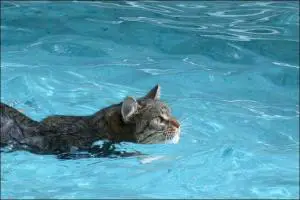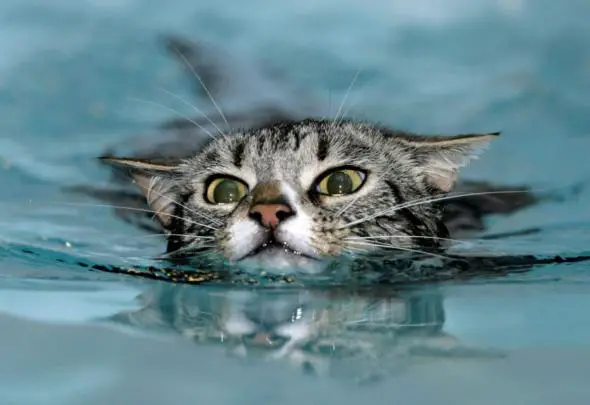If you own a cat and have ever for one reason or another had to give it a shower or bath you will know that cats seem to hate water. I remember when our cat Nipper rolled over into something very unsavoury. It was on its back and it could not clean it by itself so it was down to me to clean it.
For more cat facts, read here.
I decided the best option was to put it in the bath and use the shower head to wash it down. By the end my arms were cuts to ribbons and Nipper was very angry with me! So this brings me to the question:
Can cats swim?
You might be in for a shock: yes, cats can and do swim. One of the most common stereotypes of cats is that they hate the water because they do not have the ability to swim. While it is true that domestic cats generally dislike water, it isn’t because of any kind of swimming incompetence. There are a number of reasons for the average cat’s lack of comfort in the water.
In this article I am going to go over which cats can swim. Why most cats seem to hate getting wet and if it is safe to have your cat around water.
Can all cats swim?
Can cats swim? Yes. Believe it or not, all domestic cats are able to swim, at least theoretically. Whether an owner ever sees his or her pet practice this skill is a totally different matter. Many cats go their whole lives without setting foot in water, while others may learn to enjoy splashing in a shallow pool or bath. Now, knowing that domestic cats can swim doesn’t mean you should go throw your pet in the pool.
If a cat shows an interest in water, it will find its way by itself. Never force a cat into a pool of water just to see if it can swim, it really will not appreciate it. Just because they can swim doesn’t mean they are good at it or like it, most cats will only swim if they need to for safety.
Do wild cats swim?
Can cats swim? Big cats (i.e. tigers, lions, jaguars, and leopards) are far more comfortable in the water that domestic cats. This is mostly due to necessity.
Tigers are famous for their love of water. Youngsters splash each other for fun while their parents rest in the cool waters during hot days. Tigers will pursue their prey into ponds and rivers if they are in need of a meal. Water is no obstacle.
After tigers, leopards are probably the strongest swimmers of the big cats. They can quickly go from climbing trees to swimming through rapids while chasing after their prey.
Lions are less known to swim, but there have been instances of lions that adapted to being in the water. When forced into swamps and lakes to find food, these big cats become swimmers just like tigers.
There’s a pattern emerging here, isn’t there? Cats will enter the water to find food if their situation forces them to. Over time, these big cats adapt into beings that are very capable in the water. Your average house cat doesn’t need to cross rivers and lakes to find its food bowl, however. This makes swimming much less of a necessity, and much less likely for owners to witness. Some domestic cats, though, are better in the water than others.

Can cats swim? This Jaguar is a wild big cat that is great at swimming
Which breeds of domestic cats are the best at swimming?
Some breeds stand out from the pack. Perhaps unsurprisingly, breeds originating from regions near a major water source tend to be the most aquatically comfortable. However, some breeds’ attraction to splashin’ is unexplained. Here are a few examples of cats that are fans of the water. Can cats swim, which breeds can?
Turkish-Van cat
The modern Turkish Van breed is descended from the feral Van cats in eastern Turkey known to swim in Lake Van. Van cats are known as “swimming cats” to locals and the Turkish Van cats have retained at least some of their ancestors’ water-loving heritage.
American bobtail and Japanese bobtail cats.
The defining feature of these two breeds is an unusually short tail. The “bobbed” tail may help these breeds more easily swim, but scientists are unsure.
The Manx cat.
Manx cats are originally from the Isle of Man. In many cases, a cat of this breed will not even have a tail. They are known as excellent rodent hunters. For that reason, they were popular to have aboard sailing ships to control the rat population.
The Norwegian forest cat.
This breed’s uniquely long-haired coat is water resistant. Norwegian Forest cats are descendants of Viking ship cats so they are predisposed to being near water. Having a waterproof coat makes this possible.
The Maine Coon cat.
This breed has some physical similarities with the Norwegian Forest cats, and these Maine natives also share their Scandinavian cousins’ comfort in and around water. This hunting breed was a favorite of fishermen and sailors.
Other cat breeds that are good swimmers.
Bengal cats and Savannah cats are two other breeds known to enjoy splashing around. These two breeds are genetically closer to their wild ancestors than most other breeds, which is a likely explanation for their attraction to water.
Can cats swim better than dogs?
In general, no. This is mostly due to the fact that domestic cats do not have much of a use for water outside of drinking it. Unlike their wild cousins (like tigers and jaguars), domestic cats do not need to hunt for food, let alone venture into bodies of water looking to catch fish. Make sure to provide them with good food.
Cats also don’t need water to be able to wash themselves. Dogs do. Because of this, dogs are introduced to water at a very early age by their owners giving them baths. In contrast, cats will have almost zero interaction with water, unless they sneak into the bathtub or shower.
A less scientific, more folkloric reason could be that unlike fun-loving, spontaneous dogs, cats like to be in more control of their surroundings. The sensation of being in the water may be frustrating to felines.
If cats can swim why do they not like water?

Can cats swim? Some cats hate water and will not respond well to the occasional shower or bath.
Scientists aren’t completely sure why domestic cats typically dislike water. Like I said above, part of the reason could be the fact that cats tend to not have very much experience with water from an early age. Getting splashed becomes an uncomfortable experience that they will try to avoid.
One theory is that the thickness of a cat’s coat plays a role in its reaction to water. Thick, non-resistant coats can become extremely heavy if soaked in water, making swimming and even moving around on land a difficult experience.
One of my cats loves water but the other hates it, why?
My own cat actually loves playing with water. If I leave a glass of water out in the open, he will immediately run to it and dip her paw in. After flicking her paw back and forth for a little while to the point of being soaked, she will actually drink off of her own paw. Then she repeats the process over and over again.
Her interest ends there, and if she gets accidentally splashed she quickly scampers away to another room. This may not be true for all cats, but I have definitely heard from other cat owners that they have seen their pets participate in this type of behavior. I think it speaks to the individuality of each cat.
As any cat owner will understand, each animal has its own unique personality. Think about it this way: some humans love to go swimming, while others are terrified of the water. Each person’s personality and behaviors is determined by different contexts. The same goes for cats.
So many factors go into whether your cat likes or dislikes water, or why your cat only eats one kind of food, or whatever example you might think of. There is no black-and-white rule that determines whether your cat likes the water or not.
Safety for cats around water.

Can cats swim? Cats do have the ability to swim, they might not like to though.
Although we now know that cats can swim, and that not even all of them hate water, that doesn’t mean we cat owners can let our guard down.
The most common water-related threat to the modern domestic cat is the at-home swimming pool. Most standard pool covers fail to adequately carry the weight of small animals. If a cat walked onto the cover (especially at night) it may collapse into the pool and prevent the pet from escaping the water. Look for a heavy-duty pool cover that can both hold weight and completely cover any open cracks between the pool and pool deck where an animal could fall in.
Another safety upgrade that pet owners can make is by adding small ramps to the side of the pool. Cats and dogs cannot see the steps in and out of the pool because they are underwater. In a moment of panic, these pets could very well tire out and drown. Owners might invest in small plastic ramps (e.g. the “Skamper Ramper”) that can attach to the side of the pool, dock, or boat. Cats (and dogs) then have the ability to safely exit the water on their own.
In conclusion…
Can cats swim? Domestic cats do share an ability to swim with their big cat distant cousins. However, pet owners may never witness this in person due to a number of factors. Some breeds are more comfortable with water than others, but it varies between every individual cat.
Even though cats can swim, it is still best for owners to remain vigilant and protect their pets from water related accidents that could quickly turn tragic.
let me know in the comments section if your cat is a swimmer. Or does your cat hate water with a passion?
